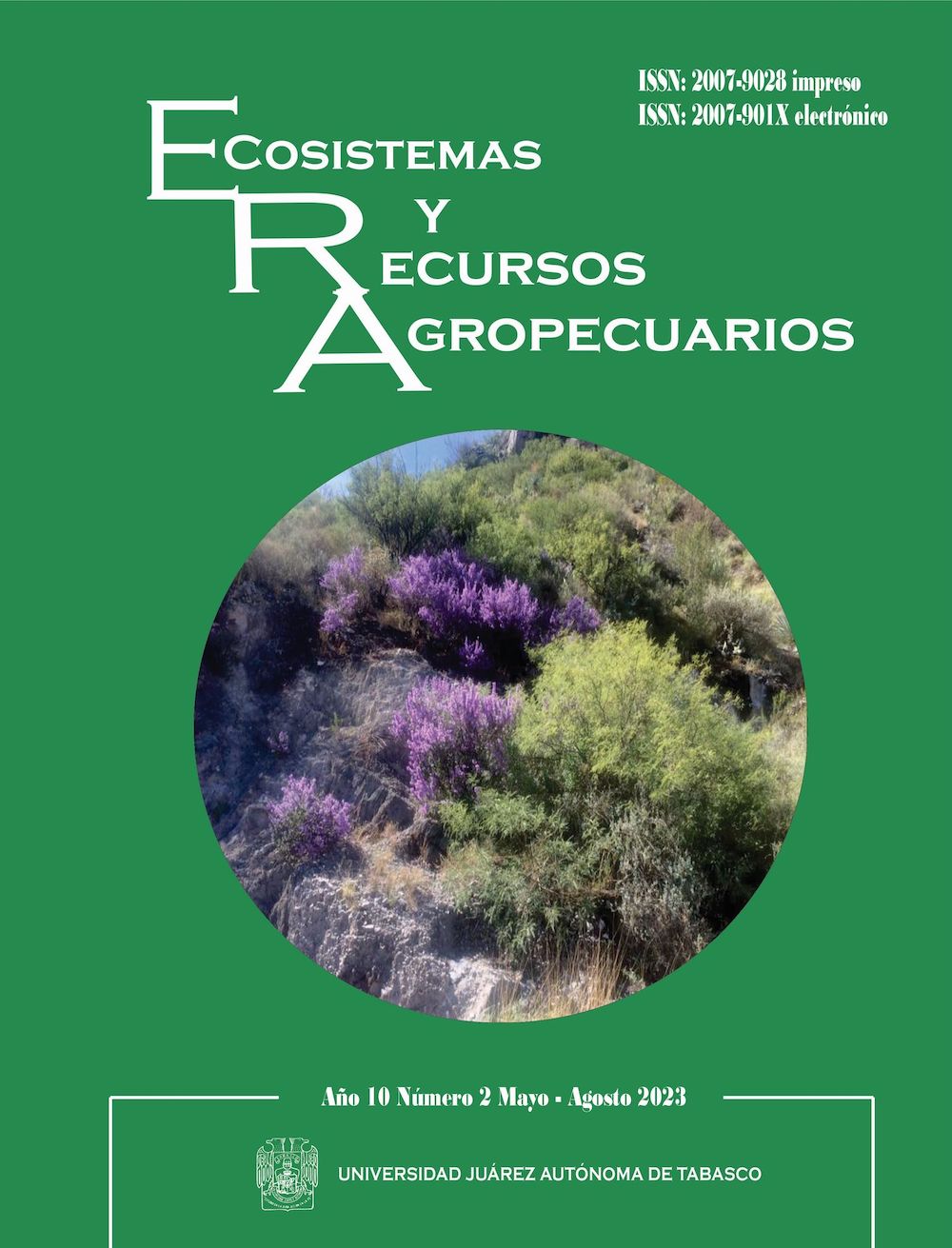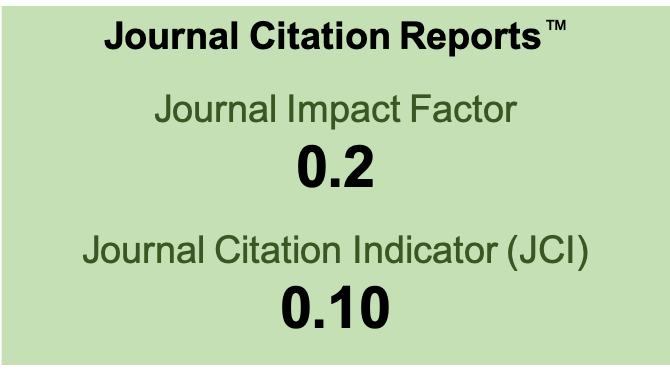Introgression of transgenic events and accompanying sequences into Mexican maize varieties
DOI:
https://doi.org/10.19136/era.a10n2.3538Keywords:
Razas mexicanas, contaminación genética, PCR, eventos transgénicos, Cry1Ab, ntpIIAbstract
Representative seed samples of 215 of maize varieties from four
(Jalisco, Michoacán, Oaxaca and Puebla) Mexican States were collected. The total genotypes collected in each State were 53, 96, 46 and 20 samples, respectively. Each seed collection was geo-referenced, then seed was planted and leaf tissue was used for DNA isolation, after that a PCR analysis was performed to determine the presence or absence of eight accompanying sequences and nine transgenic
events in the 215 maize genotypes. Results showed introgression of accompanying sequences and transgenic events (cry1Ab) into some maize varieties. The major proportion of cry1Ab residues was observed in maize samples from Puebla (70%)
followed by that displayed in the Oaxaca samples (52%), while Jalisco samples showed 15 and 7.5% of the cry1Ab gene and ntpII accompanying sequence, respectively, and Michoacán samples exhibited 44 and 17.7% for cry1Ab gene and the accompanying sequence, respectively. These results supported for applicate corrective measures for to prevent the genetic contamination of Mexican maize varieties and to clean up out-of-type phenotypes that could be sources of contamination of transgenic genes within maize populations contaminated with transgenes.
Downloads
References
Agapito-Tenfen S, Lopez FR, Mallah N, Abou-Slemayne G, Trtikova M, Nodari RO, Wickson F (2017) Transgene flow in Mexican maize revisited: Socio-biological analysis across two contrasting farmer communities and seed management systems. Ecology and Evolution 7: 9461-9472.
Arce Romero A, Monterroso Rivas AI, Gómez Díaz JD, Palacios Mendoza M, Navarro Salas EN, López Blanco JC, Álvarez AC (2020) Crop yield simulations in Mexican agriculture for climate change adaptation. Atmósfera 33: 215-231.
Brookes G, Barfoot P (2016) GM crops: Global socio-economic and environmental impacts 1996- 2016. PG Economics Ltd. UK. 198p.
Brookes G (2022) GM crops: Global socio-economic and environmental impacts 1996-2020. PG Economiscs Ltd. UK. 215p.
Carvajal P, Ureña H, Umaña J, Sancho C, Solano F, Arleo M, Martínez C, Umaña R (2017) Detección molecular de secuencias de ADN transgénico en alimentos de consumo humano y animal en Costa Rica. Agronomía Costarricense 41: 53-68.
CCA (2004) Maíz y biodiversidad: Efectos del maíz transgénico en México. Comisión para la Cooperación Ambiental. Edicion en español. Canada. 51p.
Cleveland DA, Soleri D, Aragón Cuevas F, crossa J, Gepts P (2005) Detecting (trans)gene flow to landraces in centers of crop origin: lessons from the case of maize in Mexico. Environmental Biosafety Research 4: 197-208.
De-Ita A (2012) La defensa internacional del maíz contra la contaminación transgénica en su centro de origen. El Cotidiano 73: 57-65.
Erenstein O, Jaleta M, Sonder K, Mottaleb K, Prasanna BM (2022) Global maize production, consumption and trade: trends and R&D implications. Food Security 14: 1295-1319.
Eze CE, Akinwale RO, Michel S, Burstmayr H (2020) Grain yield and stability of tropical maize hybrids developed from elite cultivars in contrasting environments under a rainforest agro-ecology. Euphytica 216(89): 1: 13. DOI: 10.1007/s10681-020-02620-y.
Fonseca FMA, Guevara HF, García GA, Márquez RC, Parra VMR (2023) Diversity of local maize in ejidos of the Frailesca region of Chiapas, Mexico. Tropical and Subtropical Agroecosystems 26: 017. DOI: 10.56369/tsaes.4131.
Fonteyne S, Castillo CJB, Lopez-Ridaura S, Van Loon J, Espidio BJ, Osorio AL, Martínez HF, Odjo S, Verhulst N (2023) Review of agronomic research on the milpa, the traditional polyculture system of Mesoamerica. Frontiers in Agronomy 5: 1115490. DOI: 10.3389/fagro.2023.1115490.
García JA, Toscana AA (2016) Presencia de maíz transgénico en la Sierra Norte de Oaxaca. Un estudio desde la mirada de las comunidades. Sociedad y Ambiente 12: 119-144.
González JA, Reyes ML (2014) El conocimiento agrícola tradicional, la milpa y la alimentación: el caso del Valle de Ixtlahuaca, Estado de México. Revista de Geografía Agrícola 52-53: 21-42.
Graham HC, Mayers P, Henry RJ (1995) A simplified method for the preparation of fungal genomic DNA for PCR an RAPD analysis. Biotechniques 16: 48-50.
Grote U, Fasse, A Nguyen TT, Erenstein O (2021) Food security and the dynamics of wheat and maize value chains in Africa and Asia. Frontiers in Sustainable Food Systems 4: 617009. DOI: 10.3389/fsufs.2020.617009.
Guzzon F, Arandia Rios LW, Caviedes Cepeda GM, Céspedes Polo M, Chavez Cabrera A, Muriel Figueroa J, Medina Hoyos AE, Jara Calvo TW, Molnar TL, Narro León LA, Narro León TP, Mejía Kerguelén SL, Ospina Rojas JG, Vázquez G, Preciado-Ortiz RE, Zambrano JL, Palacios Rojas N, Pixley KV (2021) Conservation and use of Latin American maize diversity: Pillar of nutrition security and cultural heritage of humanity. Agronomy 11: 172. DOI: 10.3390/agronomy11010172.
Ibarrola-Rivas MJ, Castillo G, González J (2020) Social, economic and production aspects of maize systems in Mexico. Investigaciones Geográficas (102): e60009. DOI: 10.14350/rig.60009.
ISAAA (2019) Global status of commercialized Biotech/GM crops in 2019: Biotech crops drive socio economic development and sustainable environment in the new frontier. ISAAA. Brief No. 55. ISAAA: Ithaca, NY https://www.isaaa.org/resources/publications/briefs/55/. Accessed: June 26, 2023.
Li H, Lui K, Zhang M, Zhang Y, Li S, Wang X, Zhou J, Zhao Y, Liu T, Li Ch (2023) Mixing trait-based corn (Zea mays L.) cultivars increases yield through pollination synchronization and increased cross-fertilization. The Crop Journal 11: 291-300.
Lohn AF, Trtikova M, Chapela I, Binimelis R, Hilbeck A (2021) Transgene behavior in genetically modified teosinte hybrid plants: transcriptome expression, insecticidal protein production and bioactivity against a target insect pest. Environmental Sciences Europe 33(67): 1-13. DOI: 10.1186/s12302-021-00506-x.
Lopez-Hernandez E (2020) GMO Corn, Mexico, and coloniality. Vanderbilt Journal of Entertainment and Technology Law 22: 725-783.
Mercer KL, Wainwright JD (2008) Gene flow from transgenic maize to varieties in Mexico: An analysis. Agriculture Ecosystems and Environment 123: 109-115.
Orozco-Ramírez Q, Ross-Ibarra J, Santacruz-Varela A, Brush S (2016) Maize diversity associated with social origin and environmental variation in Southern Mexico. Heredity 116: 477-84.
Ortega-Villegas MN, Zizumbo-Villarreal L, Monterroso-Salvatierra N, Hernández-Lara OG (2018) Seed and transgenic maize laws: Analysis from the coproduction between science and rconomic-political regimes in Mexico. Agricultura, Sociedad y Desarrollo 15: 413-442.
Ortiz TJ, Sánchez-Sánchez OM, Ramos-Prado JM (2014) Actividades productivas y manejo de la milpa en tres comunidades campesinas del municipio de Jesús Carranza Veracruz México. Polibotánica 38: 173-191.
Piñeyro N, Heerwaarden AJV, Perales HR, Serratos HJA, Rangel A, Hufford MB, Gepts P, Garay-Arroyo A, Rivera-Bustamente R, Alvarez-Buylla ER (2009) Transgenes in mexican maize: Molecular evidence and methodological considerations for GMO detection in landrace populations. Molecular Ecology 18: 750-761.
Quist D, Chapela I (2001) Transgenic DNA introgressed into traditional maize landraces in Oaxaca Mexico. Nature 44: 541-543.
Rendón-Aguilar B, Bernal-Ramírez LA, Bravo-Avilez D, Rocha-Munive MG (2019) Temporal dynamics of detected transgenes in maize landraces in their center of origin. Revista mexicana de biodiversidad 90: e902653. DOI: 10.22201/ib.20078706e.2019.90.2653.
Salgotra RK, Chauhan BS (2023) Genetic diversity, conservation, and utilization of plant genetic resources. Genes 148(1): 174. DOI: 10.3390/genes14010174.
Sánchez Morales P, Romero Arenas O (2018) Evaluación de la sustentabilidad del sistema milpa en el estado de Tlaxcala México. Revista de El Colegio de San Luis 8: 107-134.
Santillán-Fernández A, Salinas-Moreno Y, Valdez-Lazalde JR, Bautista-Ortega J, Pereira-Lorenzo S (2021) Spatial Delimitation of Genetic Diversity of Native Maize and Its Relationship with Ethnic Groups in Mexico. Agronomy 11(4): 672. DOI: 10.3390/agronomy11040672.
Serratos-Hernández JA, Gómez-Olivares JL, Salinas-Arreortua N, Buendía-Rodríguez E, Islas-Gutiérrez F, deIta A (2007) Transgenic proteins in maize in the soil conservation area of Federal District Mexico. Frontiers in Ecology and the Environment 5: 247-252.
Sharma P, Singh SP, Iqbal HMN, Parra-Saldivar R, Varjani S, Tong YW (2022) Genetic modifications associated with sustainability aspects for sustainable developments. Bioengineered 13: 9508-9520.
Vidal O, Brusca R (2020) Mexico’s biocultural diversity in peril. Revista de Biología Tropical 68: 669-691.
Voora V, Larrea C, Bermudez S (2020) Global market report: Soybeans. International Institute for Sustainable Development. https://www.jstor.org/stable/pdf/resrep26554.pdf. Accessed: May 20, 2023.
WHO (2015) Connecting global priorities: Biodiversity and human health. A state of knowledge review. First edition. World Health Organization and Secretariat of the Convention on Biological Diversity. Canada. 344p.
Downloads
Published
How to Cite
Issue
Section
License
Copyright (c) 2023 Ecosistemas y Recursos Agropecuarios

This work is licensed under a Creative Commons Attribution-NonCommercial-ShareAlike 4.0 International License.
Aviso de copyright
Los autores que se envían a esta revista aceptan los siguientes términos:
una. Los autores conservan los derechos de autor y garantizan a la revista el derecho a ser la primera publicación del trabajo con una licencia de atribución de Creative Commons que permite a otros compartir el trabajo con un reconocimiento de la autoría del trabajo y la publicación inicial en esta revista.
B. Los autores pueden establecer acuerdos complementarios separados para la distribución no exclusiva de la versión del trabajo publicado en la revista (por ejemplo, en un repositorio institucional o publicarlo en un libro), con un reconocimiento de su publicación inicial en esta revista.
C. Se permite y se anima a los autores a difundir su trabajo electrónicamente (por ejemplo, en repositorios institucionales o en su propio sitio web) antes y durante el proceso de envío, ya que puede conducir a intercambios productivos, así como a una cita más temprana y más extensa del trabajo publicado. (Consulte El efecto del acceso abierto).



